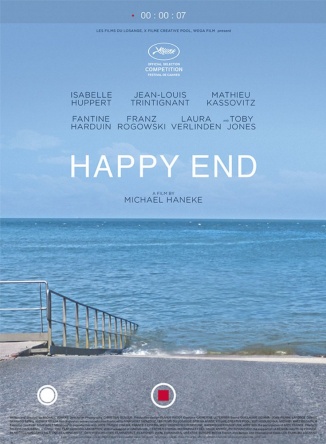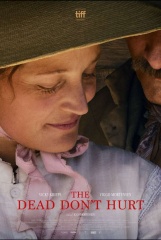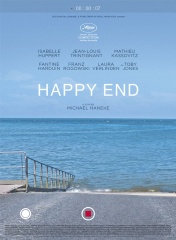|
|
HAPPY END
70. Festival del Cinema di Cannes (17-28 Maggio 2017) - Concorso - Preview in English by Peter Debruge (www.varety.com) - Germania: Dal 12 Ottobre
"Racconto non solo la borghesia. Cerco di attraversare la vita con gli occhi aperti e non potevo non parlare della societĂ del nostro tempo, del nostro modo di vivere autistico che ci circonda e ci riguarda anche in prima persona"
Il regista e sceneggiatore Michael Haneke
(Happy End; FRANCIA/AUSTRIA/GERMANIA 2017; Drammatico; 107'; Produz.: ARTE France Cinéma/France 3 Cinéma/Les Films du Losange/Wega Film/X-Filme Creative Pool; Distribuz.: Cinema)
 See Short Synopsis
See Short Synopsis
|
Titolo in italiano: Happy End
Titolo in lingua originale:
Happy End
Anno di produzione:
2017
Anno di uscita:
2017
Regia: Michael Haneke
Sceneggiatura:
Michael Haneke
Cast: Toby Jones (Lawrence Bradshaw)
Isabelle Huppert (Anne Laurent)
Mathieu Kassovitz (Thomas Laurent)
Jean-Louis Trintignant (Georges Laurent)
Laura Verlinden (AnaĂŻs Laurent)
Franz Rogowski (Pierre Laurent)
Fantine Harduin (Eve Laurent)
Nabiha Akkari
Loubna Abidar
Dominique Besnehard
Jackee Toto (Migrante)
Hassam Ghancy (Rachid)
David El Hakim (Garçon de Plage)
Franck Andrieux
Jack Claudany (Bourgeois)
Fotografia: Christian Berger
Montaggio: Monika Willi
Makeup: Frédérique Ney, Vesna Peborde e Fabie Roger
Casting: David El Hakim
Scheda film aggiornata al:
30 Maggio 2017
|
Sinossi:
In breve:
La storia di una grande famiglia altoborghese che ha ormai perso i suoi valori. Specchio di una societĂ votata alla falsitĂ , all'egoismo e all'infelicitĂ . Sullo sfondo, Calais, spazio di transito per i rifugiati.
In altre parole, Happy End rappresenta e racconta l'anima nera della borghesia ormai priva di empatia. Protagonista una famiglia ricca, i Laurent, che vive a Pas de Calais, tra i disagi degli immigrati: dietro la facciata di normalitĂ c'Ăš solo indifferenza anche verso se stessi.
Il patriarca Ăš George (Jean-Louis Trintignant). La figlia maggiore, Anne (Isabelle Huppert), segue gli affari di famiglia e ha a che fare con l'immaturo figlio Pierre (Franz Rogowski). Il fratello di Anne, Thomas (Mathieu Kassovitz), cura i suoi affari, mentre sua figlia Eve (Fantine Harduin) esprime il suo disgusto filmando tutto, dal criceto alle prese con il pasto al tentativo di suicidio del nonno.
Short Synopsis:
A drama about a family set in Calais with the European refugee crisis as the backdrop
Commento critico (a cura di Peter Debruge, www.variety.com)
|
If there werenât already a film called 'Loveless' in competition at Cannes, that would have made an apt title for Michael Haneke's cynical 'Amour' follow-up.
Michael Haneke is up to his old tricks in âHappy End,â a movie that finds the chilly Austrian maestro returning to obsessions that have haunted his earlier work â from cultural nihilism to bourgeois solipsism, cold-hearted murder to compassionate end-of-life solutions â and in at least one case, continuing a story left unresolved in his previous film, âAmour.â
Although it reunites Jean-Louis Trintignant and Isabelle Huppert in uncannily similar father-daughter roles, âHappy Endâ hardly qualifies as an âAmourâ sequel. In fact, if there werenât already a film called âLovelessâ in competition at this yearâs Cannes film festival, that would have made an apt title for Hanekeâs latest. Certainly, thereâs almost no trace of the humane, empathetic sensibility that somehow snuck its way into âAmourâ to |
|
be found here â which isnât necessarily a bad thing, considering the director spent most of his career spelunking the ice caves of his own cynicism, successfully unsettling us with what he found there.
Audiences not already familiar with the demands of Hanekeâs more misanthropic work could be put off, if not entirely confounded as the director returns to his austere conceptual roots, reuniting with DP Christian Berger â whose rigid formalism set the look of âCachĂ©â (2005) and âThe White Ribbonâ (2009) â to catalog this new familyâs dysfunction at a distance, all but announcing that their sins are those of Europe at large (another similarity with Andrey Zvyagintsevâs âLoveless,â which did the same for Russia).
For Hanekeâs longtime admirers, it will come as no surprise to learn there are no happy endings ahead for the Laurent clan. Let it also be said, however, that nothing so grim as the climactic |
|
group suicide of âThe Seventh Continentâ (1989) awaits them either â although the downbeat implication remains that malcontent Europeans might be better off dead than living in such a screwed-up world as this.
That seems to be the view of bitter 84-year-old Laurent family patriarch Georges (Trintignant), who snuffed his own wife some years earlier and now seems eager to join her (his idea of a happy end?). Georges finds no comfort in sharing his Callais home with his two avaricious children, manipulative real-estate developer Anne (Huppert) and twice-married doctor Thomas (Mathieu Kassowitz), but canât find anyone to assist his exit â until, conveniently enough, the ideal (yet horrifyingly inappropriate) candidate arrives at his doorstep.
Georgesâ desire for euthanasia is but one of many thorny themes under scrutiny here, several of which extend beyond the Laurentsâ generally selfish personalities to include the plight of local immigrants, from the âMoroccan slavesâ who serve |
|
the family to the nameless Africans they pass on the street â echoes of âCode Unknownâ (2000). Depending on how you see it, Hanekeâs new film is either a âbeen there, done thatâ rehash of old themes or an exciting return to form, demanding real effort from already sophisticated festival and art-house crowds as they attempt to untangle the cinematic equivalent of the ultra-tricky Saturday crossword puzzle. Either way, âHappy Endâ amounts to a complex, minutely detailed mystery in which every member of the Laurent household contributes to the movieâs almost suffocating sense of malaise.
Our discomfort begins with a series of lo-res Instagram Live-style videos. In the first, someone spies on a womanâs predictable nightly toilette routine, after which a twisted kid tries an experiment on the family hamster, feeding it momâs antidepressant pills to see what happens (hint: the American Humane Society would not approve). After nearly six minutes |
|
of such clips, Haneke cuts to security-camera footage of a massive construction site, which seems calm enough until a freak accident brings one of the walls crumbling down on top of the workers below.
Though Haneke hasnât provided enough context for us to understand what weâre watching, that doesnât stop him from reprimanding us for what he perceives as our twisted sense of voyeurism. To some extent, âHappy Endâ serves to update Hanekeâs VHS-era provocation âBennyâs Videoâ (1992), also shot by Berger, as the director indicts Instagram, Facebook and YouTube as platforms that propagate such sociopathic behavior (which may be true to an extent, but rather naively excludes the many ways social media has made the world a more connected and potentially empathetic place as well).
Still, it seems harsh to follow a series of what may as well be snuff-film clips â the hamster ODs, and later we discover that a |
|
worker died during that cave-in â with a conventionally scripted scene in which a young girl absorbs the news that her mother overdosed on pills. (Technically, Haneke directed everything in the movie, even the opening âfound footage,â though he plays with audiencesâ ever-evolving notion of what is real, clearly aware that amateur-looking online videos read as more authentic than classical filmmaking techniques.) The girl in question is Georgesâ 12-year-old granddaughter, Ăve (Fantine Harduin), whose father Thomas has no choice but to bring her back to the family home in Callais, where her stepmother (Laura Verlinden) has been raising Ăveâs newborn half-brother.
Because Haneke disapproves of traditional exposition, audiences must do their own detective work, puzzling out whoâs who around the Laurent dinner table â which is too much effort when our brains are already working overtime to make sense of the other oblique clues the film so stingily dispenses. An annotated |
|
family tree would go a long way to help, considering that Huppertâs description of Ăve as âmy brotherâs daughter by his ex-wifeâ sounds like a tricky calculus equation â one that still leaves many questions unanswered, like who is the stranger on the other end of her English-language phone calls? And, why does her son Pierre (Franz Rogowski) care so much about the plight of immigrants, when the one he knows gives him a black eye and a bloody nose?
There are answers to these questions, of course, although itâs disheartening to report that Anne and her son represent two of the movieâs least interesting roles (their intrigues have mostly to do with the succession of the family business and a deal that sheâs gone to great lengths to arrange). Everyone here has secrets theyâre hiding from the others, though Georgesâ and Ăveâs illicit desires emerge as the most fascinating, if |
|
only because theyâre so far removed from how we first read these two characters â who both factor into a final shot that ranks among the most chilling of Hanekeâs career, even as it earns the darkest of laughs. Itâs as if the director has tied up loose ends from his earlier films, while forcing us to re-examine issues that have only grown more dire since he first brought them to our attention. |
|
|
|
|
|
|
|
|
|
|
|
|
|
|
Perle di sceneggiatura
Links:
• Criminal (Interviste)
• 66 Mostra: Lido di Venezia 8 settembre 2009 PRESS CONFERENCE & DINTORNI: LO SPAZIO BIANCO di FRANCESCA COMENCINI (Interviste)
• 67. Mostra del Cinema di Venezia: LA SOLITUDINE DEI NUMERI PRIMI - INTERVISTA al regista SAVERIO COSTANZO (Interviste)
• THE NEXT THREE DAYS - INTERVISTA al regista PAUL HAGGIS (A cura dell'inviata SARA MESA) (Interviste)
• NELLA CASA - INTERVISTA al regista FRANĂOIS OZON (Interviste)
• CAFARNAO - CAOS E MIRACOLI - INTERVISTA alla regista NADINE LABAKI (Interviste)
Galleria Fotografica:
1
Fatal error: Uncaught Error: Call to undefined function str_starts_with() in /web/htdocs/www.celluloidportraits.com/home/util.php:223
Stack trace:
#0 /web/htdocs/www.celluloidportraits.com/home/schedamovie.php(775): makeLinkVideo()
#1 {main}
thrown in /web/htdocs/www.celluloidportraits.com/home/util.php on line 223
|









